| This article includes a list of references, related reading, or external links, but its sources remain unclear because it lacks inline citations. Please help improve this article by introducing more precise citations. (July 2022) (Learn how and when to remove this message) |
| First Orbán Government | |
|---|---|
65th Cabinet of Hungary | |
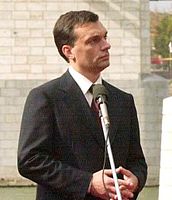 | |
| Date formed | 8 July 1998 |
| Date dissolved | 27 May 2002 |
| People and organisations | |
| Head of state | Árpád Göncz (Ind.) Ferenc Mádl (Ind.) |
| Head of government | Viktor Orbán |
| Member party | Fidesz, MDF, FKgP |
| Status in legislature | Majority 213 / 386 (55%) |
| Opposition party | MSZP, MIÉP and SZDSZ |
| Opposition leader | Gyula Horn, László Kovács (MSZP) Gábor Kuncze, Bálint Magyar (SZDSZ) István Csurka (MIÉP) |
| History | |
| Election | 1998 election |
| Outgoing election | 2002 election |
| Legislature term | 1998-2002 |
| Predecessor | Horn Government |
| Successor | Medgyessy Government |
The First Orbán Government was the fourth democratically elected government in Hungary after the regime change. It existed between 1998 and 2002. Its creation was made possible by the FKgP: the party withdrew 82 candidates in the second round of the election, so FKgP voters voted for the local Fidesz candidate instead, thus reversing the election result. Due to the resignations in the Parliament afterwards, the votes of the way smaller but still large number of 48 smallholder representatives were essential for the formation of the government. The governmental relationship between the two parties was formed by the coalition agreement developed by the negotiating delegations, led by László Kövér and Béla Szabadi. The coalition government consisted of three parties: Fidesz, FKgP and MDF. The latter was introduced to the Parliament with the help of Fidesz. Prime Minister Viktor Orbán took his oath of office on July 6, 1998, and his ministers took office on July 8, two days later. The coalition was dissolved in 2001, if not formally, but on its merits: the coalition agreement virtually expired. The FKgP could not even recall Imre Boros, even though the right to nominate belonged to the party. From the moment that József Torgyán, the chairman of the FKgP, was forced to resign as a minister because of his son's so called "cassette case", although he was able to retain his position within the party, but his position weakened considerably: his party faction expelled the party chairman from the group with votes from Fidesz supporters and in violation of house rules. He assured the government of the support of five members who had previously been expelled or separated from the smallholder faction, leaving a majority in the National Assembly for a time. At the same time, the government received external support from MIÉP.
Party breakdown
Beginning of term
Party breakdown of cabinet ministers in the beginning of term:
| 6 | |
| 4 | |
| 1 | |
| 7 |
End of term
Party breakdown of cabinet ministers in the end of term:
| 7 | |
| 4 | |
| 1 | |
| 6 |
Composition
| Office | Image | Incumbent | Political party | In office | |
|---|---|---|---|---|---|
| Prime Minister | 
|
Viktor Orbán | Fidesz | 6 July 1998 - 27 May 2002 | |
| Minister of the Prime Minister's Office | 
|
István Stumpf | Independent | 8 July 1998 - 27 May 2002 | |
| Minister of Internal Affairs | 
|
Sándor Pintér | Independent | 8 July 1998 - 27 May 2002 | |
| Minister of Foreign Affairs | 
|
János Martonyi | Independent | 8 July 1998 - 27 May 2002 | |
| Minister of Finance | Zsigmond Járai | Independent | 8 July 1998 - 31 December 2000 | ||

|
Mihály Varga | Fidesz | 31 December 2000 - 27 May 2002 | ||
| Minister of Economy | 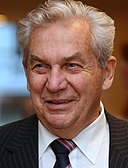
|
Attila Chikán | Independent | 8 July 1998 - 31 December 1999 | |

|
György Matolcsy | Independent | 31 December 1999 - 27 May 2002 | ||
| Minister of Agriculture and Rural Development | 
|
József Torgyán | FKgP | 8 July 1998 - 15 February 2001 | |

|
Imre Boros | FKgP | 15 February 2001 - 25 March 2001 | ||
| András Vonza | FKgP | 25 March 2001 - 27 May 2002 | |||
| Minister of Justice | 
|
Ibolya Dávid | MDF | 8 July 1998 - 27 May 2002 | |
| Minister of Health | Árpád Gógl | Fidesz | 8 July 1998 - 31 December 2000 | ||
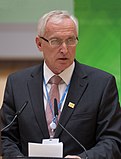
|
István Mikola | Independent | 31 December 2000 - 27 May 2002 | ||
| Minister of National Cultural Heritage | 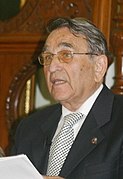
|
József Hámori | Independent | 8 July 1998 - 31 December 1999 | |
| Zoltán Rockenbauer | Fidesz | 31 December 1999 - 27 May 2002 | |||
| Minister of Education | 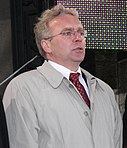
|
Zoltán Pokorni | Fidesz | 8 July 1998 - 15 July 2001 | |

|
József Pálinkás | Fidesz | 15 July 2001 - 27 May 2002 | ||
| Minister of Social Affairs | 
|
Péter Harrach | Fidesz | 8 July 1998 - 27 May 2002 | |
| Minister of Defence | 
|
János Szabó | FKgP | 8 July 1998 - 27 May 2002 | |
| Minister of Environment | Pál Pepó | FKgP | 8 July 1998 - 19 June 2000 | ||
| Ferenc Ligetvári | FKgP | 19 June 2000 - 30 November 2000 | |||

|
Béla Turi-Kovács | FKgP | 30 November 2000 - 27 May 2002 | ||
| Minister of Transportation, Communication
and Water |
Kálmán Katona | Independent | 8 July 1998 - 31 May 2000 | ||
| László Nógrádi | Fidesz | 31 May 2000 - 30 November 2000 | |||

|
János Fónagy | Fidesz | 30 November 2000 - 27 May 2002 | ||
| Minister for Youth and Sport | 
|
Tamás Deutsch | Fidesz | 1 January 1999 - 27 May 2002 | |
| Minister without portfolio
for Secret Services |

|
László Kövér | Fidesz | 8 July 1998 - 2 May 2000 | |
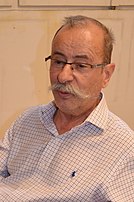
|
Ervin Demeter | Independent | 2 May 2000 - 27 May 2002 | ||
| Minister without portfolio
for the coordination of the PHARE programme |

|
Imre Boros | FKgP | 4 October 2004 - 9 June 2006 | |
References
József Bölöny: Magyarország kormányai 1848–2004 (Governments of Hungary from 1848 to 2004) Az 1987–2004 közötti időszakot feldolgozta és sajtó alá rendezte Hubai László. 5. bővített és javított kiadás. (the period between 1987 and 2004 was written by László Hubai) Budapest, Akadémiai Kiadó. 2004. ISBN 963-05-8106-X
| Viktor Orbán | ||
|---|---|---|
| ||
| Premiership |   | |
| Governments | ||
| Parliamentary elections | ||
| Family |
| |
| Related | ||
| Governments of Hungary | |
|---|---|
| |
| |
| |
| |
| Counter-governments (1919-21) |
|
| |
| |
| |